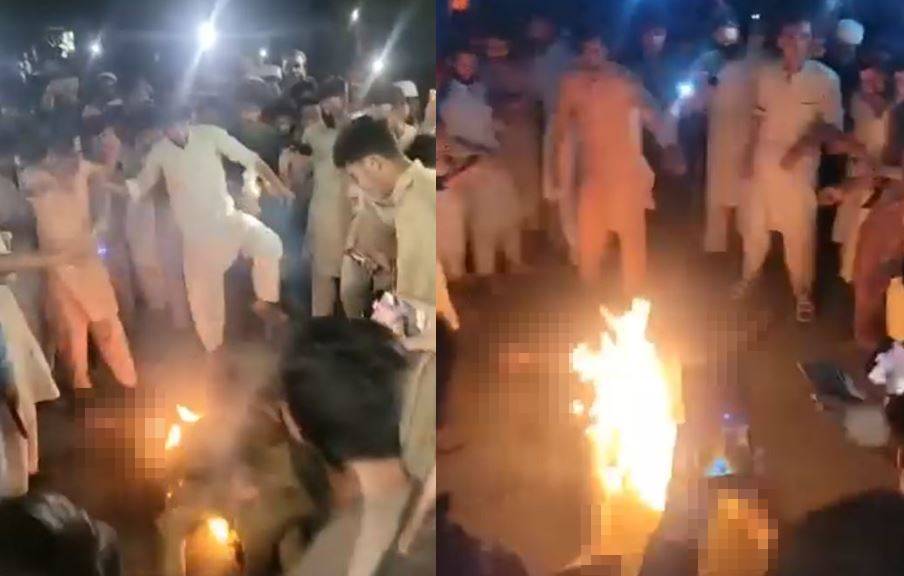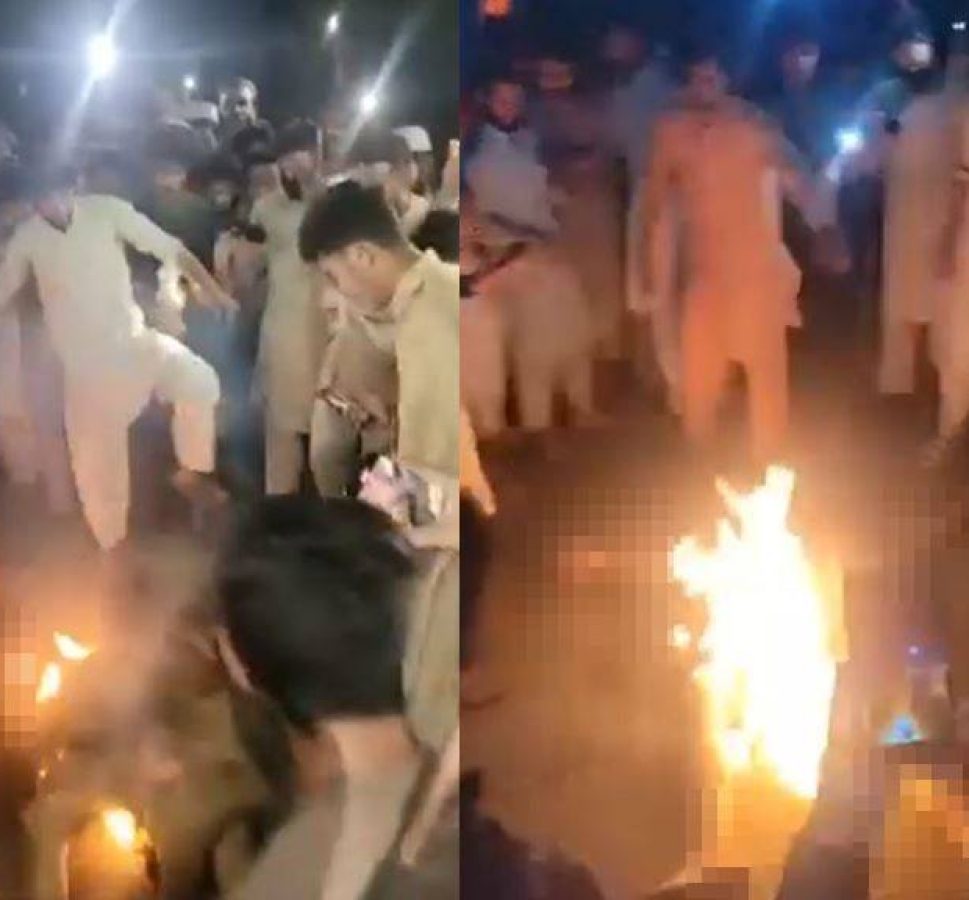
Videos circulating on social media show a large crowd chanting religious slogans and surrounding a burning body.
Islamabad, Pakistan – A 36-year-old man has been killed and his body burned in Pakistan’s northwestern province of Khyber Pakhtunkhwa after he was accused of desecrating the Quran, the holy book of Muslims.
The incident occurred on Thursday evening in Madyan, a town in the Swat district, a popular tourist spot located 280km (174 miles) from the capital city of Islamabad.
Police officials in Swat reported that the man, whose identity has not been disclosed, was a tourist from Sialkot, Punjab, who had been accused of “insulting the Quran”. It is unclear precisely what the man did.
“Our police team reached the main market in Madyan to arrest the man and took him to the police station, but the crowd demanded to have him handed over,” a police official told Al Jazeera on condition of anonymity.
Officials added that a large group of hundreds of people gathered outside the Madyan police station where the man was being held by police, attacked the premises and dragged the man out before killing him. How he was killed is unclear, although one police source based at the central Swat police headquarters, about one hour away from Madyan, told Al Jazeera by telephone that the man had been “tortured to death”. Videos circulating on social media show a large crowd chanting religious slogans and surrounding a burning body.
A senior Swat police official, Zahid Ullah Khan, told the media that the group also set fire to the police station and a police vehicle. He added that investigations into the incident were under way.
However, the police have not confirmed whether a First Information Report (FIR) was filed regarding the incident or if any arrests have been made.
Officials at the Civil Hospital in Madyan confirmed to Al Jazeera that at least eight people were brought in overnight with minor injuries from the incident, and all have been treated and discharged.
While traffic was temporarily halted through the main market area of Madyan overnight, local officials stated that the situation in town has returned to normal with businesses operating and tourist traffic flowing as usual.
Khyber Pakhtunkhwa Chief Minister Ali Amin Gandapur also condemned the tourist’s death and requested an immediate report on the incident from the police.
According to a statement from the chief minister’s office, Gandapur directed the provincial police chief to take emergency measures to control the situation.
Pakistan’s draconian blasphemy laws
Pakistan’s blasphemy laws are based on the legal system of its British colonial rulers, who introduced laws related to religion in 1860 to quell Hindu-Muslim violence in the Indian subcontinent.
These laws remained unchanged following Pakistan’s creation in August 1947, but were first amended in 1974, when a constitutional amendment declared the Ahmadiyya sect, a 500,000-strong religious minority which considers itself to be Muslim, as “non-Muslim”.
During the rule of military dictator General Zia-ul-Haq from 1977 to 1988, the laws were further strengthened with new criminal offences such as defiling the Quran, insulting Islam’s prophet, or using “derogatory” language about certain religious figures.
Blasphemy remains one of the most sensitive subjects in Pakistan, where even insinuations of accusations can lead to widespread violence.
Since 1987, more than 2,000 people have been accused of blasphemy, and at least 88 people have been killed because of such allegations, according to the Centre for Social Justice, an independent group based in Lahore advocating for minority rights, which compiles data relating to blasphemy cases in Pakistan.
Last month, in Sargodha, Punjab, a 70-year-old Christian man was attacked and seriously injured by a group of people, who accused him of desecrating the Quran. The group then started a riot, setting shops on fire and damaging houses belonging to other Christian families in the area.
Police managed to control the violence and rescue the accused, but he died from his injuries nine days later.
In yet another incident in February last year, in Nankana Sahib, Punjab, an angry group attacked a police station and killed a man who had been accused of blasphemy after forcibly removing him from police custody.
In August 2023, Christian communities in Punjab’s Jaranwala town faced widespread attacks on their homes and churches following accusations of Quran desecration by two brothers. More than 22 churches were burned down, and nearly 100 houses were damaged.
Arafat Mazhar, a Lahore-based academic researching Pakistan’s blasphemy laws, said the issue raises serious concerns regarding both security and civil rights. “There is nothing more terrifying than blasphemy-related violence.”
“In the 1980s, the Pakistani state made a promise that anyone hinting or insinuating blasphemy, whether malicious or not, would be killed,” Mazhar told Al Jazeera. “This led to a surge in blasphemy accusations, and when people saw the state did not fulfil its promise, however absurd, they took the law into their own hands.”
Mazhar emphasised that while there is increasing intolerance in society as a result of “the expansion of far-right hate groups”, the fundamental problem lies with the laws that criminalise blasphemy.
“The state must rethink the promise it made decades ago. It needs to counter the surge in blasphemy accusations, radically amend the law and prevent its misuse against people.”






